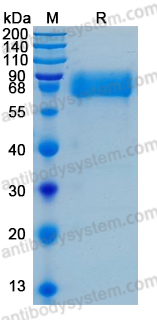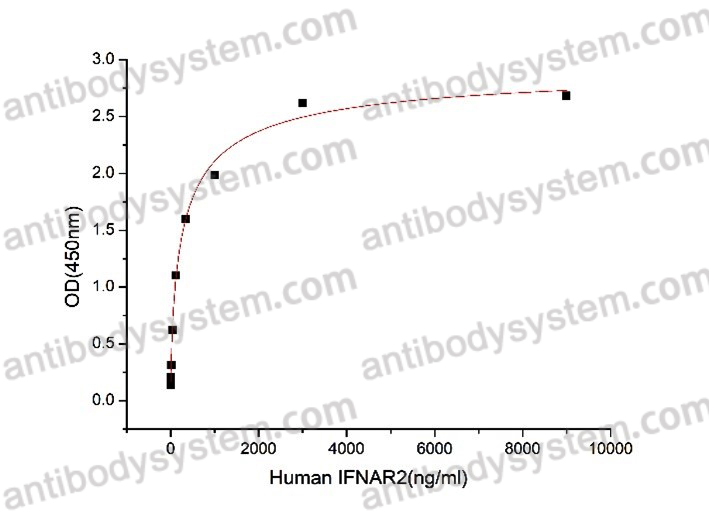Catalog No.
AHE59001
Biological activity
Immobilized recombinant human IFNA2 at 2 μg/mL (100 μL/well) can bind human IFNAR2 (Cat #: AHE59001) with a linear range of 0.2-617 ng/mL.
Expression system
Mammalian Cells
Species
Homo sapiens (Human)
Protein length
Ile27-Lys243
Nature
Recombinant
Endotoxin level
<0.1 EU/μg of the protein by the LAL method.
Purity
>90% as determined by SDS-PAGE.
Accession
P48551
Applications
Bioactivity, ELISA, Immunogen, SDS-PAGE, WB
Form
Lyophilized
Storage buffer
Lyophilized from a solution in PBS pH 7.4, 5% Trehalose, 5% Mannitol.
Reconstitution
Reconstitute in sterile water for a stock solution.
Shipping
In general, proteins are provided as lyophilized powder/frozen liquid. They are shipped out with dry ice/blue ice unless customers require otherwise.
Stability and Storage
Use a manual defrost freezer and avoid repeated freeze thaw cycles. Store at 2 to 8°C for one week. Store at -20 to -80°C for twelve months from the date of receipt.
Alternative Names
Interferon alpha binding protein, Interferon alpha/beta receptor 2, IFNAR2, IFN-alpha binding protein, IFN-R-2, IFNABR, IFNARB, Type I interferon receptor 2, IFN-alpha/beta receptor 2
Exploring the Mechanism of Luteolin in Protecting Chickens from Ammonia Poisoning Based on Proteomic Technology., PMID:40422902
The African swine fever virus B125R protein antagonizes JAK-STAT signalling by promoting the degradation of IFNAR2., PMID:40270033
Intestinal mucosal transcriptomic responses of Asian seabass (Lates calcarifer) vaccinated with an oral hydrogel-encapsulated multivalent Vibrio antigen following Vibrio spp. infection., PMID:40252617
Bilirubin metabolism in the liver orchestrates antiviral innate immunity in the body., PMID:40153433
Type I interferon autoantibody footprints reveal neutralizing mechanisms and allow inhibitory decoy design., PMID:40111224
The contribution of genetic determinants of blood gene expression and splicing to molecular phenotypes and health outcomes., PMID:40038547
β-hydroxybutyrylation and O-GlcNAc modifications of STAT1 modulate antiviral defense in aging., PMID:39979583
Characterizing the diabetes-induced pathological changes of the mouse lung by single-cell RNA sequencing., PMID:39832739
Protein kinase a suppresses antiproliferative effect of interferon-α in hepatocellular carcinoma by activation of protein tyrosine phosphatase SHP2., PMID:39826687
Alternative splicing landscape in mouse skeletal muscle and adipose tissue: Effects of intermittent fasting and exercise., PMID:39725041
A common form of dominant human IFNAR1 deficiency impairs IFN-α and -ω but not IFN-β-dependent immunity., PMID:39680367
Regulation of human interferon signaling by transposon exonization., PMID:39672162
Association study of the JAK/STAT signaling pathway with susceptibility to COVID-19 in moroccan patient and in-silico analysis of rare variants., PMID:39647533
Expression of Toll-like Receptor Genes and Antiviral Cytokines in Macrophage-like Cells in Response to Indole-3-carboxylic Acid Derivative., PMID:39599833
Recombinant soluble type I interferon receptor exerts antiviral activity by inducing proteins related to autophagy., PMID:39577364
Promiscuous Janus kinase binding to cytokine receptors modulates signaling efficiencies and contributes to cytokine pleiotropy., PMID:39561221
Severe Adverse Reaction to Measles Vaccine Due to Homozygous Mutation in the IFNAR2 Gene: A Case Report and Literature Review., PMID:39436454
pK205R targets the proximal element of IFN-I signaling pathway to assist African swine fever virus to escape host innate immunity at the early stage of infection., PMID:39405340
Association of IFNAR2 and TYK2 with COVID-19 pathology: current and future., PMID:39351231
A sensitive assay for measuring whole-blood responses to type I IFNs., PMID:39312669
IFN Receptor 2 Regulates TNF-α-Mediated Damaging Inflammation during Aspergillus Pulmonary Infection., PMID:39212415
Expression of human Interferon Regulatory Factor 3 (IRF-3) in alveolar macrophages relates to clinical and functional traits in COPD., PMID:39160551
Development of a highly sensitive platform for protein-protein interaction detection and regulation of T cell function., PMID:39106307
Construction of an IFNAR1 knockout MDBK cell line using CRISPR/Cas9 and its effect on bovine virus replication., PMID:39100665
OIP5-AS1 enhances the malignant characteristics and resistance to chemotherapy of pancreatic cancer cells by targeting miR-30d-5p/MARCH8., PMID:39050450
Stratified analyses refine association between TLR7 rare variants and severe COVID-19., PMID:38944683
SENP6 restricts the IFN-I-induced signaling pathway and antiviral activity by deSUMOylating USP8., PMID:38906982
Proximal protein landscapes of the type I interferon signaling cascade reveal negative regulation by PJA2., PMID:38802340
Dissemination of influenza B virus to the lower respiratory tract of mice is restricted by the interferon response., PMID:38780249
TYK2, IFITM3, IFNAR2 and OAS3 single-nucleotide polymorphisms among severe COVID-19 ICU patients in Morocco., PMID:38760017
Evaluation of IFNAR2 and TYK2 transcripts' prognostic role in COVID-19 patients: a retrospective study., PMID:38741892
The association between single-nucleotide polymorphisms within type 1 interferon pathway genes and human immunodeficiency virus type 1 viral load in antiretroviral-naïve participants., PMID:38698440
Study on the correlation between DPP9 rs2109069 and IFNAR2 rs2236757 polymorphisms with COVID-19 mortality., PMID:38660988
Structural basis for the recognition of IFNAR1 by the humanized therapeutic monoclonal antibody QX006N for the treatment of systemic lupus erythematosus., PMID:38649079
African swine fever virus pB318L, a trans-geranylgeranyl-diphosphate synthase, negatively regulates cGAS-STING and IFNAR-JAK-STAT signaling pathways., PMID:38620034
Structure-function of type I and III interferons., PMID:38608537
Meta-DHGNN: method for CRS-related cytokines analysis in CAR-T therapy based on meta-learning directed heterogeneous graph neural network., PMID:38546326
Molecular Profile of Variants Potentially Associated with Severe Forms of COVID-19 in Amazonian Indigenous Populations., PMID:38543725
Age-related transcript changes in type I interferon signaling in children and adolescents with long COVID., PMID:38522030
Rickettsia rickettsii virulence determinants RARP2 and RapL mitigate IFN-β signaling in primary human dermal microvascular endothelial cells., PMID:38445878
African swine fever virus pH240R enhances viral replication via inhibition of the type I IFN signaling pathway., PMID:38353534
A small molecule iCDM-34 identified by in silico screening suppresses HBV DNA through activation of aryl hydrocarbon receptor., PMID:38135680
[Interferon-α mediating the functional damage of CD56dimCD57+natural killer cells in peripheral blood of systemic lupus erythematosuss]., PMID:38101777
Participation of Single-Nucleotide Variants in IFNAR1 and IFNAR2 in the Immune Response against SARS-CoV-2 Infection: A Systematic Review., PMID:38003785
An extracellular humanized IFNAR immunocompetent mouse model for analyses of human interferon alpha and subtypes., PMID:37994664
Type I interferon signaling induces a delayed antiproliferative response in respiratory epithelial cells during SARS-CoV-2 infection., PMID:37975674
Differential expression of Type I interferon and inflammatory genes in SARS-CoV-2-infected patients treated with monoclonal antibodies., PMID:37904704
The Relationship between COVID-19 Severity in Children and Immunoregulatory Gene Polymorphism., PMID:37896870
Translating GWAS Findings to Inform Drug Repositioning Strategies for COVID-19 Treatment., PMID:37886583
Regulation of human interferon signaling by transposon exonization., PMID:37745311


